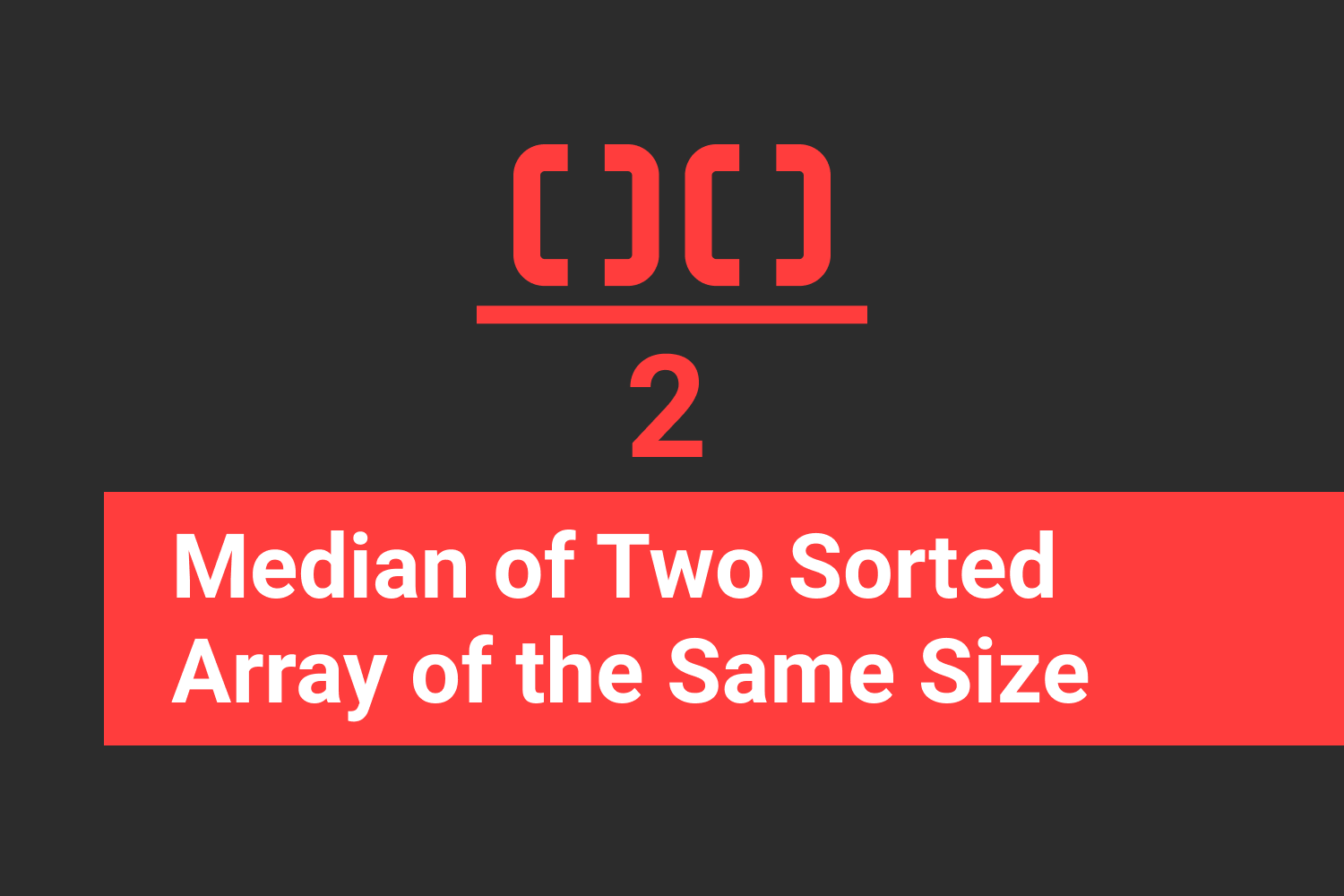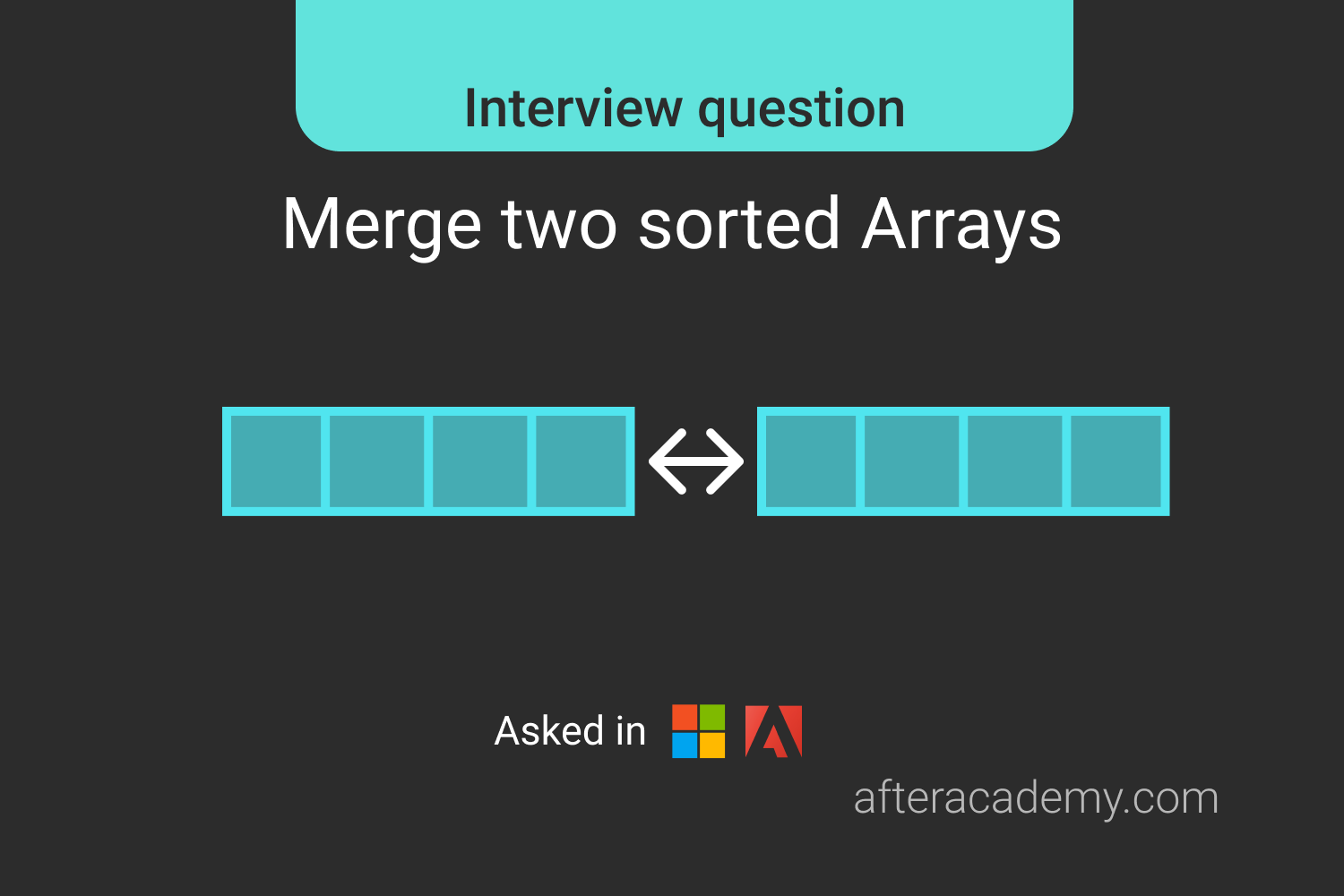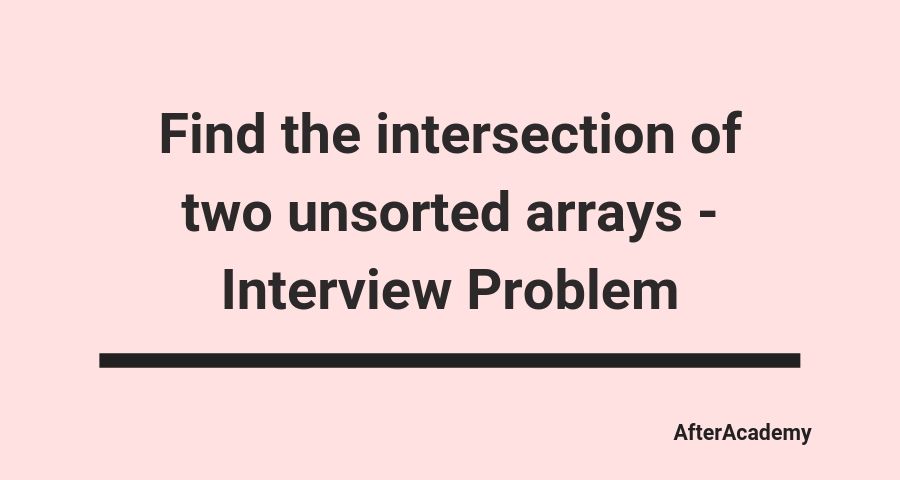Median of the Two Sorted Array of Same Size
AfterAcademy Tech
•
29 Feb 2020

Understanding The Problem
Problem Description
There are two sorted arrays nums1 and nums2 of size n. Find the median of the two sorted arrays.
You may assume nums1 and nums2 cannot be both empty.
Example 1:
nums1 = [1, 3]
nums2 = [2, 4]
The median is 2.5 as (2 + 3) / 2 = 2.5
Example 2:
nums1 = [1, 2, 9]
nums2 = [3, 4, 7]
The median is (3 + 4)/2 = 3.5
What is Median?
The median is the value separating the higher half of a data sample, a population, or a probability distribution, from the lower half. For a data set, it may be thought of as the “middle” value.
For odd n, Median (M) = value of ((n + 1)/2)th item term.
For even n, Median (M) = value of {(n/2)th item term + (n/2 + 1)th item term}/2
Note → Since the size of the two input arrays for which we are looking for the median is even(2n), we need to take the average of the middle two numbers and return it.
Solutions
We will be discussing linear and logarithmic solutions for the problem
- Counting while comparing — Find the middle elements after merging the sorted array using the merge procedure of merge sort.
- Comparing medians — Get the medians of two sorted arrays and compare the medians and move accordingly until the two medians become equal following divide and conquer approach.
1. Counting While Comparing
For this approach, we actually have to find those two elements that could be in the middle when the two arrays are merged in sorted order.
If we follow the merge procedure like the one in merge sort then we could just compare the values at the two pointers pointing two the indexes of the two arrays and then increment the pointers accordingly while keeping track of the count. If count becomes n(For 2n elements), we have reached the median. Take the average of the elements at indexes n-1 and n in the merged array.
Solution Steps
- Create two pointers
iandjpointing twonums1andnums2respectively and initialize them with0 - If the value at
nums1[i] < nums2[j]then incrementiotherwise, incrementj - Repeat step 2 until
iorjbecomesi+jequals to n - Return median of the two elements at ith and jth indexes.
Pseudo Code
float getMedian(int num1[], int num2[], int size) {
int i = 0
int j = 0
int m1 = -1, m2 = -1
for (count = 0 to size) {
if (i == size) {
m1 = m2
m2 = num2[0]
break
}
else if (j == size) {
m1 = m2
m2 = num1[0]
break
}
if (num1[i] < num2[j]) {
m1 = m2
m2 = num1[i]
i = i + 1
} else {
m1 = m2
m2 = num2[j]
j = j + 1
}
}
return (m1 + m2)/2
}
Complexity Analysis
Time Complexity: O(n), where is the size of both the input arrays
Space Complexity: O(1)
Critical Ideas to Think
- Did you recognize that the merge approach is similar to the one used in merge sort?
- Why we are returning (m1 + m2)/ 2 in the end?
- If we have created an auxiliary array and save both the arrays in a sorted manner and then return its median, will it give the correct result? If yes then what would be its time and space complexity?
2. Comparing medians
This approach works by comparing the two medians of both the array following the Divide & Conquer paradigm. If the first median is greater than the second median then we will look for the median of the two sorted arrays in num1[0 to median1] and num2[median2 to n]. (Why?)
We know that median1 is larger than or equal to the first half of num1. And the same for median2 and num2. At the same time, we also know that median1 is smaller than or equal to the second half of num1.
Let’s consider the case median1 > median2
num1: [.....median1.....]
num2: [.....median2.....]
num1+num2: [.....median2...median1........]
Let us call the median of the merged array m*. Since the first halves of num1 and num2 come before median1. So, median1 >= m*, this means that no values larger than median1 need to be considered in num1. So we only need to look in the first half or ar1.
Similarly, since the second halves of num1 and num2 come after median1, we have that median2 <= m*, this means that no values smaller than median2 need to be considered and we only need to look in the second half of num2.
Example →
num1 = {1, 12, 15, 26, 38}
num2 = {2, 13, 17, 30, 45}
med1 = 15 and med2 = 17 for num1[0 to 4] and num2[0 to 4]
med1 < med2. So median is present in {15, 26, 38} and {2, 13, 17}
now, med1 = 26 and med2 = 13
med1 > med2. So median is present in {15, 26} and {13, 17}
The size of both the subarrays are now 2. So,
median = (max(15,13) + min(26, 17))/2 = 16
Solution Steps
- Calculate the median of both the arrays, say
m1andm2fornum1[]andnum2[]. - Repeat till the size of
num1andnum2becomes two.
- If
m1 == m2then return m1. - If
m1 > m2then median will be present in either of the sub-arraysnum1[0..m1]andnum2[m2 to n]. - If
m2 > m1then median will be present in either of the sub-arraysnum1[m1 to n]andnum2[0 to m2].
3. Return Median = (max(array1[0],array2[0]) + min(array1[1],array2[1]))/2
Pseudo Code
float getMedian(int num1[], int num2[], int size) {
// base cases
if (size <= 0)
return -1
if (size == 1)
return (num1[0] + num2[0]) / 2
if (size == 2)
return (max(num1[0], num2[0]) + min(num1[1], num2[1])) / 2
int med1 = median(num1, size)
int med2 = median(num2, size)
// compare the medians
if (med1 == med2)
return med1
if (med1 < med2) {
// recurse for the subarray num1[m1 to size] and num2[0 to m2]
if (size % 2 == 0)
return getMedian(num1 + size/2 - 1, num2, size - size/2 + 1)
else
return getMedian(num1 + size / 2, num2, size - size / 2)
} else {
// recurse for the subarray num1[0 to m1] and num2[m2 to n]
if (size % 2 == 0)
return getMedian(num2 + size / 2 - 1, num1, size - size / 2 + 1)
else
return getMedian(num2 + size / 2, num1, size - size / 2)
}
// Utility function to find median of array
int median(int arr[], int array_size) {
if (array_size % 2 == 0)
return (arr[array_size / 2] + arr[array_size / 2 - 1]) / 2
else
return arr[array_size / 2]
}
Complexity Analysis
Time Complexity: O(log n), where n is the size of both the arrays
Space Complexity: O(log n) (Why?)
Critical Ideas to Think
- Can you code this approach in an iterative manner?
- Why does the comparison of medians and moving accordingly will reach the correct result?
- What would be the median when the two sorted arrays are of length two?
Comparison of Different Solutions

Suggested Problems to Solve
- Median of two sorted arrays of different sizes
- Median in a row-wise sorted matrix
Written by AfterAcademy Tech
Share this article and spread the knowledge
Read Similar Articles
AfterAcademy Tech
Merge Two Sorted Arrays
You are given two sorted arrays arr1[ ] and arr2[ ] of sizes m and n respectively. Write a program to merge them in such a way that the resultant array is sorted too.

AfterAcademy Tech
Find the intersection of two unsorted arrays - Interview Problem
Given two integer arrays A[] and B[] of size m and n, respectively. We need to find the intersection of these two arrays. The intersection of two arrays is a list of distinct numbers which are present in both the arrays. The numbers in the intersection can be in any order.

AfterAcademy Tech
Minimum in a Sorted and Rotated array
You have a sorted and rotated array where elements are sorted and rotated circularly. Write a program to find the minimum element in the array.

AfterAcademy Tech
Sorted Array to Balanced BST
Given an array where elements are sorted in ascending order, convert it to a height balanced BST. For this problem, a height-balanced binary tree is defined as a binary tree in which the depth of the two subtrees of every node never differs by more than one.
